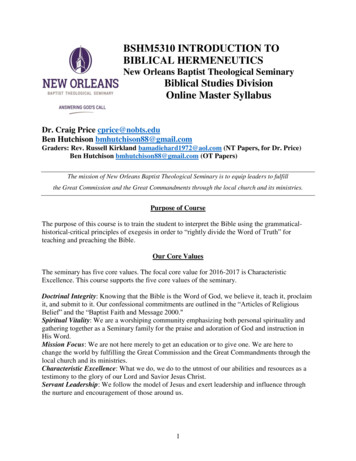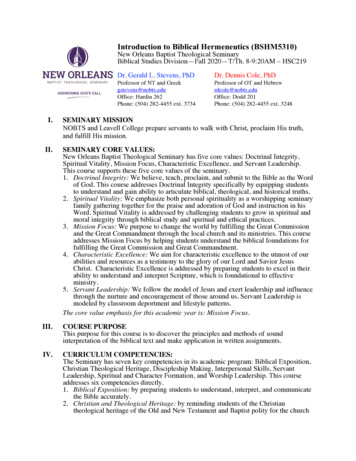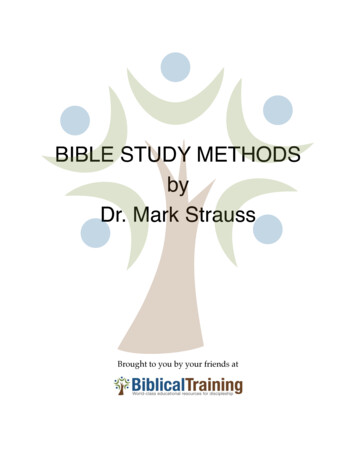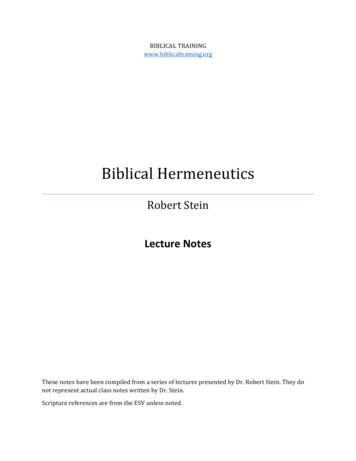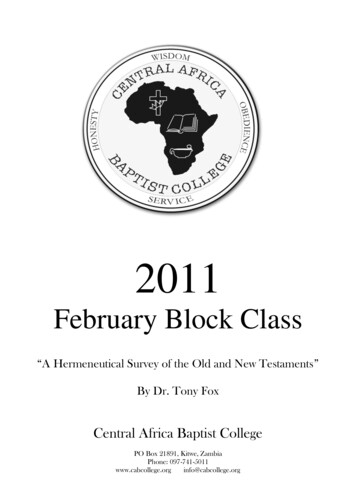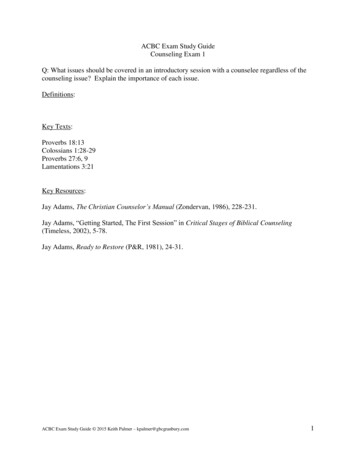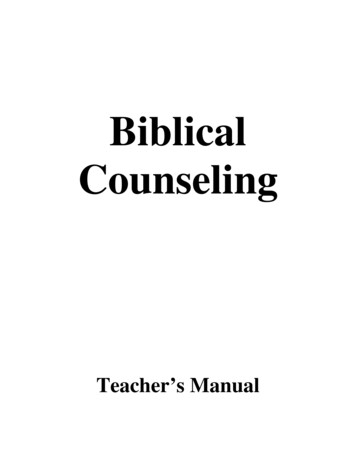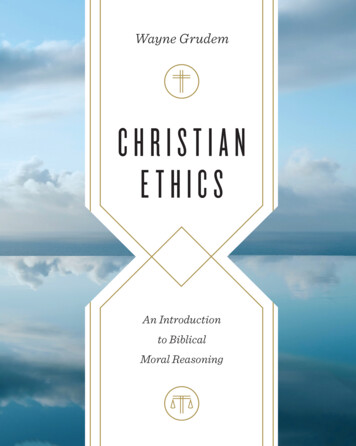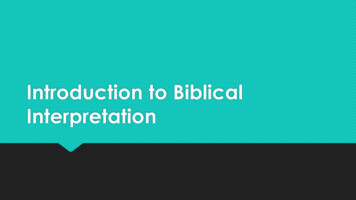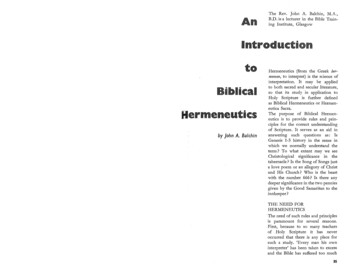
Transcription
nThe Rev. John A. Balchin, M.A.,B.D. is a lecturer in the Bible Training Institute, GlasgowIntroductiontoBiblicalHermeneuticsby John A. Ba/chinHermeneutics (from the Greek hermenetlO, to interpret) is the science ofinterpretation. It may be appliedto both sacred and secular literature,so that its study in application toHoly Scripture is further definedas Biblical Hermeneutics or Hermeneutica Sacra.The purpose of Biblical Hermeneutics is to provide rules and principles for the correct understandingof Scripture. It serves as an aid inanswering such questions as: IsGenesis 1-3 history in the sense inwhich we normally understand theterm? To what extent may we seeChristological significance in thetabernacle? Is the Song of Songs justa love poem or an allegory of Christand His Church? Who is the beastwith the number 666? Is there anydeeper significance in the two penniesgiven by the Good Samaritan to theinnkeeper?THE NEED FORHERMENEUTICSThe need of such rules and principlesis paramount for several reasons.First, because to so many teachersof Holy Scripture it has neveroccurred that there is any place forsuch a study. 'Every man his owninterpreter' has been taken to excessand the Bible has suffered too much35
and too long at the hands of thoseto whom any kind of check isunknown.Second, to prevent further divisionin the Christian Church. One of theunderstandable results of the Reformation with its emphasis on privatejudgment has been the cominginto being of an increasing numberof denominations and sects. But ifwe can at least agree on some rulesand principles of interpretation weare one step nearer to agreeing on theinterpretation itself.Third, and allied to this last reason,such study will help to prevent theexistence of further heretical sectsand the increase of existing sects;or at least to show more clearlywhy existing sects are heretical.For the majority do, or say they do,accept the authority of the Word ofGod. So it must therefore be theiruse and interpretation of the Biblewhich constitutes their particularheresy. The words which Shakespeareput into the mouth of Bassanio havesome point here: 'In religion whatdamned error but some sober browwill bless it and approve it with atext hiding the grossness with fairadornment!' The Bible can be usedto support the most flagrant heresysimply by faulty hermeneutics. Thetragic tenet of the Jehovah's Witnesses concerning blood transfusion,based on Leviticus 17: 12, is aglaring example of this.Fourth, such principles are necessarybecause of the sinful and biasedmind of the interpreter, for so oftenit is more convenient and lesscostly in Christian living to interpretScripture in one way rather thananother. An honest adherence tohermeneutical checks would help36to remedy this. Moreover, traditionhas such a powerful influence onour thought that we often fail toinvestigate the meaning of the Wordof God for ourselves. Indeed, Weapproach Scripture with certainpredispositions and preconceptionswhich in themselves may be untrueand unbiblical and consequently ourminds may well be closed to alternative interpretations. The traditionmay be right, but at least let us makesure that such traditional interpretations have been thought out firsthand and checked by sound hermeneutical rules. Truth matters morethan loyalty to a local group.Scripture must never subserve adogmatic system, and neither mustthe interpretations of Scofield, Thomson or any other pundit be put onthe same level of authority as theBible itself. Commentaries writtenright alongside the text of Scripturecan be an insidious snare. 'Scofieldsays so' does not necessarily finishany discussion on the meaning of averse. Luther has said, 'The firstbusiness of an interpreter is to let thebiblical author say what he does sayinstead of attributing to him whatwe think he ought to say.' Andthough we may not easily and lightlydisregard the thought of the Churchthroughout the centuries (the comIJJunis opinio), the Church must neverdominate in matters of interpretation.Lastly, and not of least importance,hermeneutics is necessary becauseof its bearing on the conservativeliberal debate. So often liberals, indismissing the conservative evangelical view of Scripture and authority, have really dismissed a certaininterpretation of the word 'authority'(and an obscure one at that). Thebaby of authority has been thrownout with the dirty bath water of afalse interpretation. Since both hadbeen so closely allied (to some,alas, the bath water is the baby) itis understandable that one was lostwith the other. We shall not beginto make ground on the question ofauthority until we have divorced itfrom certain obscurantist interpretations which have little to do with athoroughgoing hermeneutic. Let usbeware of unscriptural stumblingblocks.In this kind of study we have to allowa certain amount of freedom. It ishardly possible this side of heaven(and in heaven we won't need themanyway) to get a complete set ofrules by which the correct meaningis arrived at infallibly. We must notlean over so far from the completely subjectivist position that wefall over backwards into the Romancamp. We must aim at eliminatingas much of the subjective as possibleon the one hand, so ensuring thatexegesis does not become eisegesis.(For example, how much so-calledexposition of the tabernacle is reallya flight of the religious imagination?The most famous magician wouldbe hard put to produce more hithertounseen pigeons and rabbits fromhis hat than many Bible teachersget from the Word. The Bible is nota magician's top hat). Yet, on theother hand, we must allow for thefreedom of the Holy Spirit and notcramp Him by a water-tight system.And sometimes, many times, wemust in all honesty confess ourignorance! The Talmudic rule, 'Teachthy tongue to say, "I do not know," ,should constantly be observed. It issalutary to remember that there havebeen at least thirty interpretations of1 Corinthians 15 : 29!INTERPRETATION ANDAUTHORITYIt is important and necessary to pointout two differences which, by beingconfused or identified, have led tomuch wrong thinking. First, thereis the difference between interpretationand authoriry. While a right hermeneutic must be based on a correctdoctrine of authority, such a beliefdoes not bind us to anyone particularinterpretation. Often in the past,and the present, the Church hasfought unnecessary battles becauseit felt bound to one particular interpretation of a passage, especially ifthe passage had something to do withscience. It was a long time beforethe Church realized that a heliocentricview of the universe was not inopposition to Scripture (see, e.g.,Gn. 1 : 16) and that they could whileaccepting this 'new' view still keeptheir view of Scripture. So it mustbe understood that authority andinspiration are not hermeneuticalconcepts. A biblical view of authorityaccepts the Bible as the sole andfinal standard with regard to faithand conduct. But the authority stillneeds to be interpreted. There is noimposition of a literalistic understanding of Scripture on the personwho lives and thinks under theauthority of the Word of God.It is a tragedy that because a personmay have a different interpretationfrom another he is thought by thatother to have changed the seat of hisauthority. Shades of Galileo!37
INTERPRETATION ANDAPPLICATIONThe second distinction is that between interpretation and application.The meaning of any passage is one,even though it may have a numberof levels of meanings as in prophecy,and we must do all we can to findthis meaning: but the applicationmay be many. The Bible is a bookwhich teaches by principles as wellas by precept. The principle may beplainly stated or it may have to beabstracted from an historical situation. It does not and could notoffer a blue print for every possiblesituation, e.g. may I swim at campon a Sunday afternoon? (though it isconceivable that some may get helpfrom Elisha and the axe-headl).It is a great temptation to force themeaning of a passage because ofa desired application, but this mustbe firmly resisted. For example,Bernard Ramm has well pointed outthat the 'must' in John 4 : 2 ('Jesusmust needs go through Samaria')is a geographical must and oughtnot to be applied in the sense ofevangelistic opportunity. And justas the meaning of a text or passagemust not be forced because it makesa good preaching point, so it mustnot be forced because it brings ablessing. The blessing does notjustify the interpretation (thoughGod often allows us to be blessedby such means because of ourimmaturity. If we didn't get theblessing this way we might not get itat all!). Correct interpretation mustalways precede application. This ruleparticularly applies in guidance. Amissionary candidate, in trying tofind guidance as to which Bible38College she should attend, Lebanonor Glasgow, should not necessarilyfeel that Lebanon is the right onesimply because she may read in 1Kings 5 that Solomon fetched hiscedars from Lebanon. (This particularcase happens to be true.) This ishardly the original meaning of thepassage. And, at any rate, Glasgowwas at a disadvantage since it is notmentioned in Scripture. Having a'word from the Lord' is bothjustifiable and helpful providing theword is first put into its originalcontext and the true meaning grasped.For example, a fellow should notbreak off his engagement becausehe suddenly has a 'word', fromJeremiah 16 : 2 ('You shall not takea wife') though this, too, is knownnearly to have happened. The perplexed enquirer should first try todiscover if his circumstances aresimilar to those of Jeremiah's, thatis, to put the verse into its context.(He should, incidentally, try to discover a few other things as well).We must be careful not to distort thepassage just because we cannot getguidance or a blessing from it as itstands.Another subsidiary point which maybe noted under this head is that it isthe principle which must be soughtin a particular historical situationbefore the passage is applied. Thatis to say, it is the present day equivalent of the holy kiss (2 Cor. 13 : 12)which has behind it the same principleof action which must be applied.(J. B. Phillips interprets for us in his'A handshake all round, pleasel'.)Likewise with the veil of 1 Corinthians 11 : 2ff.: is the modern hat thesymbol of subjection that the veilwas when Paul wrote his letter?INTERPRETING SCRIPTUREBY SCRIPTUREThe most basic of all hermeneuticalrules is interpret scripttlre f:y scripture,and from it spring several corollaries.It is founded on the fact of the unityof the Bible. Though there are manyhuman authors there is but one divineAuthor, the Holy Spirit of truth,and such an Author cannot and doesnot contradict Himself. God isconsistent. His truth may be expressed in a variety of ways but neverin such a way as to run counter toitself. Moreover, while it is admittedthat there is progression in revelation,such progression does not meancontradiction. So then, a first stepin the interpretation of any passageis to discover what light is shed uponit by other parts of Scripture.A word in parenthesis must be addedhere. It cannot be said that Scripturethrows the )vhole light on everypassage. If this were so the study ofextra-biblical knowledge would become quite redundant. But it must beadmitted that such knowledge oftensheds great light upon the Word ofGod and for the specialist is indispensable. As Terry says, 'The professional interpreter of scripture needsmore than a well balanced mind,discreet sense and acuteness of intellect. He needs stores of informationin the broad and varied fields ofhistory, science and philosophy.'And he goes on to list geography,history, chronology, antiquities, politics, natural science, philosophy andcomparative philology!It will readily be seen that a knowledge of extra-biblical knowledge ofBabylonian mythology throws lighton Rabah in Isaiah 51 : 9; that aknowledge of Corinthian customsthrows light on Paul's teaching onthe veil in 1 Corinthians 11; thatJewish chronology helps the understanding of the phrase 'three daysand three nights' (Mt. 12: 40);and so on. But it must be addedthat extra-Biblical information in noway dictates the meaning of a passage.It serves only as a handmaid. In therealm of science especially, it maywarn us of interpretations of passageswhich are ambiguous but it may neverforce us into an interpretation whichis contradictory to other parts ofScripture. Before this parenthesison the recognized limitation of thisfirst rule is closed it must be saidthat the Bible is sufficiently selfinterpreting for 'the man in thestreet'. After all, it is addressedto him primarily.This basic principle of the selfinterpreting nature of Scripture,sometimes known as the analogyof faith, has a number of corollaries.(i) Interpret Scripture according to thepurpose of Scripture.a. The Ivhole of Scripture. The Bibleconfesses to a limited purpose.It does not profess to be an 'Enquirewithin on Everything', for thewisdom it offers to its readers is asaving wisdom, that is, a knowledgewhich is able to make us wise untosalvation (2 Tim. 3: 15). So it isnot meant to make us wise untobiology, geology, botany. The wisdom it provides is soteriological.Calvin says, 'If you would learngeology or any other recondite art,go elsewhere.' Of course, the faithdoes not come to us in vacuo. It isan historical religion and is workedout in an historical and culturalmedium. So we must be wary39
of the heterodoxy which divorces the history from the truth asthough an infallible truth can bemediated through a fallibly recordedhistory. But God has not chosento inform us on scientific matterswhich have no bearing on man'ssalvation. This would be outsidethe purpose of His Word, for theBible is the plan of God's redemption. It would be absurd, then, toexpect a 'scientific' (as we understandthis word in the twentieth century)account of creation in the first chapterof Genesis. This is not to say that thechapter is not true. But it is to saythat the beginning of things isrecorded within the self-imposedpurpose of Holy Scripture.b. Each part of Scripture. Within thisone main purpose there are severalsubsidiary purposes for the variousparts. Generally speaking, each partis written for different situationsand circumstances and the particularpurpose of a passage or book mustfirst be ascertained before the fullmeaning will become clear. Thus, tograsp the purpose of James andGalatians prevents any belief in acontradiction between Paul andJames. The purpose of each letteris different. The Apocalypse canhardly begin to be understood without realizing that its primary functionis to encourage the persecuted peopleof God (cf. Rev. 13 : 10, 14: 12),and such an understanding willprevent much grave mishandling ofthis great book. So first ask thequestion: Why did the author writethis? what need was he trying tomeet?(ii) Interpret 1!Y the context. Contextualinterpretation is a further obviouscorollary of the first basic principle.40It is a common rule, but just ascommonly disregarded. Many of us,having been brought up on the DailYLight and the tear-off calendar (excellent things both, but not reallythe best means of studying Scripture),have become bitty in our appreciationof the Word. After all, it was forconvenience of reference and not forbetter understanding that the division. of the Bible into chapters and verseswas first introduced. It has been saidthat the first step in interpretationis the ignoring of the chapters andverses. And failure to do so is oneof the gravest of mistakes in hermeneutics. Further, the immediatecontext is generally more importantthan the less immediate. The Bibletook more than a few weeks in thewriting and words tend to changetheir meaning as time passes. Consequently, word studies must bedone in a progressive framework.Perhaps a few examples of passageswhich are commonly misinterpretedwill be in place:Romans 8 : 28. What is the 'good'to which everything works togetherfor the called of God? It wouldhardly appear from the immediatecontext to be either a peacefuldomestic situation or a new avenue ofChristian service. Surely the 'good'is elaborated on and explained in thefollowing two verses. It is the threeverses read together which containthe unit of thought, not just verse 28.The 'good', then, is tied up with ourpredestination. God is working forgood in all our circumstances in thatHe is conforming us to the image ofChrist. Nothing less than this is our'good'. Paul is writing of our finaldestiny. This is the 'purpose' ofverse 28. And note that verse 29begins with 'For', showing that thereason and explanation follows. Thisis a word too often ignored in theinterpreting of Scripture. So then,the 'good' is eschatological and mustnot be reduced to mean that thetrying and incomprehensible circumstances which we are presently goingthrough will soon resolve themselvesto our own advantage.Matthew 18 : 19, 20. 'Again I say toyou, if two of you agree on earthabout anything they ask, it will bedone for them by my Father inheaven. For where two or threeare gathered in my name, there amI in the midst of them.' Generally,these verses are taken to mean thatGod will answer the prayers of themembers of a small prayer meeting,so long as they agree with each other.Now this is true, but the passage isnot primarily concerned with that.The whole context, verses 15-20,is a paragraph on church discipline,and verses 19 and 20 must be understood in the light of this. The Lordis here giving authority (in disciplinary matters) to the local church.For authority is not to be investedin one person, but in the twos andthrees who are gathered in the name ofChrist, thus guaranteeing His presence. Thus whatever they bind or looseon earth will be endorsed in heaven.(J ohn 20 : 19-23 should be comparedwith this passage, for the samething is said in a different way.)I Corinthians 3 : 10-15. These versesare commonly taken to refer to one'ssanctification, but it would appearfrom the context that they areprimarily to do with ministerialresponsibility. The wood, hay, stubble, gold, silver and precious stonesrefer to the quality of one's pastoralservices.Genesis 6: 3. 'My spirit shall notalways strive with man, for thathe also is flesh; yet his days shall be anhundred and twenty years.' The firstphrase is very frequently appliedto evangelism and conversion. Howoften have they been heard at theclose of an evangelistic addressto make the appeal more compelling.But the context does not appear tobe that of evangelism. The writeris speaking of the length of life ofman. He will only live one hundredand twenty years for he is flesh, andas soon as the Spirit which giveslife to the flesh is withdrawn ('strive'could quite possibly be read 'abide',as in RSV) the man ceases to live.(Cf. Gn. 2 : 7).(Hi) The obscure must be interpreted1!Y the clear. Someone has rightlysaid, 'Let not that which is obscurerob you of that which is clear.'But in biblical exegesis there seemsto be a natural tendency to start at thewrong place: to attempt to sort outthe difficult passages and then go onto squeeze the easier into its shape.Such methods are often current inthe realm of eschatology. For example, Revelation 20 : 1-6 is madethe starting point and all other secondcoming teaching 'edited' in the lightof it. Again, a more correct understanding of the biblical doctrineof marriage is more likely to bearrived at by examining Ephesians5 and 1 Timothy 4 before 1 Corinthians 7.(iv) Scripture must be understoodin terms of its !JJeaning or intendedmeaning to the original hearers (orreaders). This principle obtains inboth a general and a particular way.41
a. General. The Bible was writtenfor ordinary people, not primarilyfor the specialist. The divine Authoris no respecter of persons. He writesto be understood. Thus, the Bible isa 'popular' book because it is addressed to the 'populace'. So ituses popular and not specialist language. It will be seen that this hasspecial bearing on the problem of theBible and science.b. Particular. The word of the Lordcame at sundry times and in diversmanners. That is to say, it came to avariety of situations and so in a varietyof ways. The recipients in somerespects vary, for the situations inwhich the recipients were placedvary. Now God's word is always arelevant word. He addresses Himselfto the situation of the time. So thenHis word must be meaningful tothose who first hear it. Our dangertoday is that we tend to impose apresent-day meaning on the originalword which would have meantlittle or nothing to those whofirst heard it.An examination of the beatitudesmay be relevant here, for sometimesthey are understood as though theywere first given at the KeswickConvention. The disciples were ourLord's audience on that occasion.Such men would be reasonably wellversed in the Old Testament, so thatthe words and phrases which ourLord used would be understoodin their Old Testament sense. Nowthere seems to be a particularly closelink between the first part of Matthew5 and certain passages in the latterpart of Isaiah, especially chapters60 and 61. The disciples were therighteous remnant of Israel to whomso many promises were addressed42in Isaiah. These were the people whowere awaiting the messianic orderof things, the situation which isdescribed in the Isaiah chapters.Into their midst came Jesus, whowas Spirit-equipped (Lk. 3 : 22; Is.42 : 1, 11: 2, 61: 1), well-pleasedof the Father (Mt. 3 : 17; Is. 42 : 1),preaching the gospel of the kingdom(Mt. 4: 23; Is. 61: 1). Moreover,He had already confirmed the fulfilment of Isaiah 61 : 1ff. by Hisreading in the synagogue (Lk. 4:16ff.). So Jesus told them that theconditions promised in Isaiah wouldnow begin to be fulfilled. To thedisciples the 'poor' would mean the'poor' in Isaiah. (The 'poor' was asynonym for the remnant; the humblepoor became distinguished as the linein which faithfulness to the Lordwas maintained and true spiritualreligion developed. Cf. Is. 11: 1and 61: 1.) Those who 'mourn'are those who bewail the fact thatGod's righteousness is not manifestin the land. (Cf. Is. 60 : 20, 61 : 2b3a.) The meek is a parallel term to thepoor, and they shall inherit the earthor land. (Cf. Is. 60: 21). Therighteousness which is hungered andthirsted for would seem to have littleto do with imputed righteousness.So the beatitudes are not primarilycommands, but the gospel of thekingdom. This was good news:that with the coming of Messiahthere would take place the greatreversal. Because Jesus had come,the blessings of Isaiah would befulfilled.INTERPRETING BYLITERARY FORMA second basic principle is: eaclJpassage must be interpreted accordingto its literary form.Some years ago the Scriptures werepublished under the title, The BibleDesigned to be read as Literatllre.While this may lead to the danger ofreducing the Bible to the level ofany other book it at least remindsthe reader that the Bible is literature.As literature it employs all kinds ofliterary forms and categories: poetry(Psalms), prose (Samuel), parable(much' of our Lord's teaching),allegory (Ezekiel 16), apocalyptic(Revelation), fable (Judges 9 : 8-15)and so on. One of the grave errorsof some biblical interpretation is arefusal to recognize these literaryforms and to interpret accordingly.As a result it is not surprising thatthe conservative attitude to Scripturehas been dismissed by many sincerescholars in the belief that suchinterpretation represented the mainstream of evangelical thought. Tomany a literal understanding of theBible has meant interpreting everypart of Scripture as though it wereprose. As Dr. Packer says, 'It wouldbe better to call such exegesis literalistic rather than literal so as to avoidconfusing two very different things.'The question, then, which must beasked by any serious student of theBible is, 'What is the literary formor genre of the passage?' (though itmust be admitted that the answeris not always crystal clear). Then oncethe form is determined the passagemust be interpreted according to thisform. To treat poetry as prose wouldlead to all manner of absurdities.Who has seen Lebanon exercise acalf-like skip (Ps. 29: 6)? or thestars take up weapons of war(Jdg. 5: 20)? Moreover, a recognition of the literary forms of Judges4 and 5 would preclude any suggestion that these accounts of the battleof Deborah are contradictory. Theyare two different ways of describingthe same event. It must be recognizedthat poetry may employ much metaphor, hyperbole (exaggeration foremphasis) and so on. On the otherhand, it also must be recognized thatpoetry can include plain statementsof fact. 'I'm just a mole, And I livein a hole' is poetry (of a sort), but itis also a plain statement concerningthe habitat of that particular creature.Again, to treat parable as allegoryleads to many mistakes. Much ofwhat is merely furniture to set thescene in a parable (the broom, thefatted calf, the two pennies) issometimes given a meaning (theevangelist, Christ, the two sacraments)which distorts and distracts fromthe true meaning of the story.So with apocalyptic: it must not betreated as though it is continuousnarrative. A course in literary criticism would serve as a useful preludeto the study of the Bible.INTERPRETING THE OLD BYTHE NEWOur third main principle is: TheOld Testament !JJtlst be interpretedl:?J the NelP Testamellt. Since Scriptureinterprets Scripture and revelationis progressive (though not contradictory), the next major rule to beadopted is that the New Testamentmust act as our authoritative guidein understanding the Old. Threepreliminary points must first beconsidered.
(a) There is a distinction betweenquotations which are given authoritative explanations and quotationswhich are merely literary allusions.These are not always easy to distinguish but it may safely be saidthat the vast majority of quotationsfrom the Old Testament are givenauthoritative interpretations. Manysuch are introduced by an introductory formula (e.g. 'It is written','that it may be fulfilled whichwas spoken by the prophet') butnot necessarily so. In the Apocalypse for example there are manyreferences to the Old Testamentwithout such an introductory formula. At other times however,because its contents are well-knownto him, the writer may naturally usethe language of the Old Testamentin expressing his thoughts withoutmeaning to give an explanation ofsuch a phrase.(b) Often there is a presupposedtheology in the mind of the NewTestament writer which he assumeshis readers share. For example, itwould seem that the perplexingquotation, 'Out of Egypt have Icalled my son' (Ho. 11 : 1; Mt. 2: 15)which Matthew uses in referenceto Christ's departure from Egypthad some such theology. Two pointsare assumed: the Exodus typologyand the embodiment of Israel inChrist the true Son. This factormay also account for the slightlyaltered text used by the New Testament writers. Paul not only usesother versions than the Hebrewbut even ad hoc renderings of hisown, for he valued the letter not forits own sake but because it conveyeda meaning. His method was aquotation-exposition. Ellis has des44cribed Paul's use of the Old Testament as 'grammatical-historical plus',for Paul does not ignore the grammarand the history but his exegesisbegins where the grammatical-historical ends. The Old Testament has awider meaning than its immediatehistorical application. The text mustbe fitted to a proper interpretationof Old Testament history as a wholeand it is this added factor whichmust be borne in mind.The theological concept of solidaritythrows light on Paul's use of Psalm69 : 9 (Rom. 15: 3), for the application of the Psalm can naturallyand easily pass from the persecutedPsalmist to the persecuted Christ(thoughthis does not make the wholePsalm Messianic in every detail).Again, the New Testament's use ofthe 'Servant' passages in Isaiah makesthem sometimes refer to Christ andsometimes to the church, that is, tothe Servant and the servants of theServant united to Him by faith andthe Holy Spirit. See, for example,Matthew's use of Isaiah 42: 1-4(Mt. 12: 18-21) and Paul's use ofIsaiah49 : 6 (Acts 13: 47). Theformetfinds its primary fulfilment in Christ(though it would seem that part ofthe Servant's work must be accomplished throttgh the ministry ofChrist's body, the Church, and thelatter is made to refer to the Churchand to Paul and Barnabas in particular).(c) At other times when the NewTestament quotes the Old by way offulfilment it is not implied that theOld Testament words have exclusivereference to the New Testamentsituation but that in both passagesthere is a similarity of principle.The example of Acts 1: 20 mayelucidate. Here Luke makes twoquotations from imprecatory Psalms(69 : 25 and 109: 8) as being fulfilled in the fate of Judas and theappointment of a successor. It isnot suggested that this is a specificprophecy of Judas; rather the twosituations in the Psalms and Actshave a common principle, thedeposing of all enemies of God andHis cause and the raising up of therighteous to supplant them.CHRISTOLOGICALLY ANDCHURCHLYIt may further be said that the OldTestatJJent is to be tlflderstood Christologicalfy and churchfy. God is primarilyconcerned with people and theirrelationship to Him rather than withthings and places. He may teach byway of things and places (e.g. thetabernacle and Jerusalem) but theyfind their primary fulfilment inChrist and the Church. The NewTestament clearly gives very littleplace to what is merely earthlyand temporary; in fact it goes out ofits way to show their redundancy.Their purpose has been that of'object lessons' to portray the relationship between Christ and HisChurch. The 'object' has no significance in its own right.(i) The Old TestatJJent is to be understoodChristologicalfy. Our Lord Himselfhas laid the foundation for this rulein Luke 24 : 27, 44; John 5 : 39. TheOld Testament speaks of Christin various ways.a. Particular prophecies. For examplesee Isaiah 7 : 14 and Matthew 1 : 23;Micah 5 : 2 and Matthew 2 : 5, 6;Is
Introduction to Biblical Hermeneutics by John A. Ba/chin Hermeneutics (from the Greek her menetlO, to interpret) is the science of interpretation. It may be applied to both sacred and secular literature, so that its study in application to Holy Scripture is further defined as
